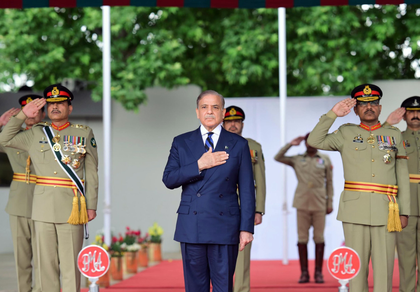US risks legitimising authoritarian consolidation in nuclear-armed Pakistan: Report
By IANS | Updated: September 4, 2025 21:10 IST2025-09-04T21:08:38+5:302025-09-04T21:10:27+5:30
Athens, Sep 4 By overlooking the ongoing political repression in Pakistan, the United States is "disincentivising democratic reform" ...

US risks legitimising authoritarian consolidation in nuclear-armed Pakistan: Report
Athens, Sep 4 By overlooking the ongoing political repression in Pakistan, the United States is "disincentivising democratic reform" and signalling to those in Islamabad and farther afield that clamping down on political opponents no longer carries international cost, a report cited on Thursday.
As Pakistani army chief Asim Munir continues to build on ties with Washington, security forces continue to clamp down on Imran Khan's Pakistan Tehreek-e-Insaaf (PTI) party domestically.
"The military's continued repression of Khan and his supporters is not sustainable and will lead to more chaos and instability. While dealing with the military-backed government may assist Trump in reaching short-term agreements, constant disorder and popular uprisings will make it impossible for the benefits of such agreements to ever be felt," Marcus Andreopoulos, an international policy analyst, wrote in 9dashline, an online portal on the Indo-Pacific's pivotal issues and shifting geopolitical landscape.
"More importantly, Washington’s willingness to turn a blind eye risks legitimising authoritarian consolidation in a nuclear-armed state. In pursuit of a pragmatic bargain in the short run, the US is producing a more fragile, less democratic, and ultimately less reliable partner," he added.
The report mentions that the "rekindled alliance" between the US and Pakistan allows Islamabad to move past this issue without its abuse of power being held to account, it will signal a grim omen for the future of democracy in the country.
Spotlighting the "positive encounters" Imran Khan had with President Trump during the latter’s first term, the report states that in December 2024, Richard Grenell, nominated by then-President-elect Trump to be his envoy for special missions, came out publicly in support of the former Prime Minister's release, likening the charges against him to the "false allegations" that had been levelled against Trump previously.
"Despite this, following his return to the White House, Trump has not adopted the cause of his once 'very good friend', and has instead pursued far closer ties with the very people who placed Khan in prison. At the end of July, Pakistan negotiated a favourable tariff deal with the US that included a dubious collaboration on oil exploration in the country. The move came after months of rapprochement between the US and Pakistan and will not have been welcomed by the PTI and its supporters. Rather than using the leverage from these tariffs to pressure the Pakistani government into releasing Khan or ensuring he receives a fair trial, Trump has instead directed it toward securing profit opportunities for US companies," wrote Andreopoulos in 9dashline.
He concluded that Trump's hobnobbing with Munir has further weakened Imran Khan's fight to get out of jail.
"Trump has shown that his approach to foreign policy in his second term will be transactional in nature, driven by an enthusiasm to offer favourable terms to governments willing to share the resources and wealth of their countries with American corporations. For the time being, therefore, Sharif and Munir have more to offer Trump than an imprisoned Khan, who is unlikely to see a change of fortune in the foreseeable future," the report said.
Disclaimer: This post has been auto-published from an agency feed without any modifications to the text and has not been reviewed by an editor
Open in app